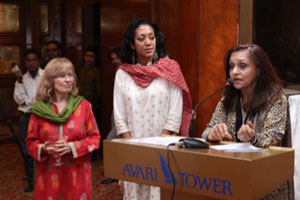Carey Brings Psychiatric Rehabilitation to Karachi, Pakistan
January 21, 2014
 “Choice, hope, and empowerment.” These are the three words Veronica Carey, PhD, an assistant clinical professor in the Behavioral Health Counseling Department, used to describe the potential outcomes of psychiatric rehabilitation. Mental health disorders too often go unnoticed, and have been considered secondary to physical health issues both domestically and internationally. Today, the prevalence of mental illness is increasing here in the U.S as well as internationally. As a result, Veronica Carey along with Barbara Granger, PhD, of Granger Consulting Services recently traveled to Karachi, Pakistan to further understand the state of mental health support systems set up in that country.
“Choice, hope, and empowerment.” These are the three words Veronica Carey, PhD, an assistant clinical professor in the Behavioral Health Counseling Department, used to describe the potential outcomes of psychiatric rehabilitation. Mental health disorders too often go unnoticed, and have been considered secondary to physical health issues both domestically and internationally. Today, the prevalence of mental illness is increasing here in the U.S as well as internationally. As a result, Veronica Carey along with Barbara Granger, PhD, of Granger Consulting Services recently traveled to Karachi, Pakistan to further understand the state of mental health support systems set up in that country.
During the past year, Carey has been working with psychiatrists, psychologists, and other professionals from The Recovery House, an organization in Pakistan that offers coordinated and structured treatment services to individuals living with severe mental illnesses. Unlike other mental health services in Pakistan, this organization specializes in the recovery process utilizing psychiatric rehabilitation interventions. After spending months using Skype and other technologies to communicate with and teach the staff members at The Recovery House, Carey was able to spend two weeks in person on site at the organization in early December 2013.
During her visit, Carey also spoke about the importance of mental health treatment in conjunction with psychiatric rehabilitation to various local mental health professionals, students, social workers, and families through a 150 person seminar organized by The Recovery House. The movement to spread awareness of the psychiatric rehabilitation approaches in Pakistan was initialized through Carey’s relationships in the Psychiatric Rehabilitation Association, where international committee member Shaheen Ahmed reached out to Drs. Carey and Granger to come to Karachi. Carey was appointed Chair of the Psychiatric Rehabilitation Association Academy in September 2013.
Though Karachi has made recent strides toward effectively treating mental health disorders, Ahmed hoped that Carey could help by providing formalized training in psychiatric rehabilitation. “Currently, Karachi has a clinical treatment system, which seeks to minimize frequency and discomfort of symptoms. However, psychiatric rehabilitation is a necessary and identifiably missing, which The Recovery House is trying to augment,” explained Carey.
According to Carey, rehabilitation does not consist of providing medication and masking a disorder, but is rather an approach in which the individual re-engages with the community, their family, and his or her passions and hobbies. “Often individuals who utilize mental health systems feel as if there is an absence of the availability of the same treasures that other people have,” explained Carey. “We want to impart to participants that those treasures are still available to them.”
Carey’s investment in training the professional staff at The Recovery House in psychiatric rehabilitation will result in their ability to sit for the international accrediting examination. She believes that as more professionals receive psychiatric rehabilitation training in Karachi, they will be able to spread the recovery-based approach throughout Pakistan and to other countries in the Middle East. Drs. Carey and Granger can be found on the 24Seven Talk show sharing their insights and information for the incorporation of psychiatric rehabilitation. Carey plans to return to Pakistan to continue her in-person work during 2014.